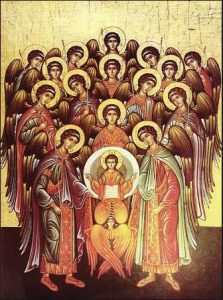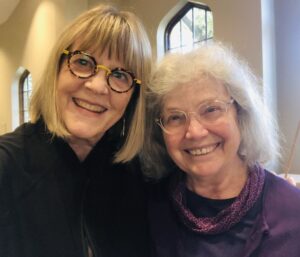For previous posts on the contributors, see these authors who were all featured in the first section of the book, “Mystics and Messengers.”
And from the second section of the book, “Angels Watching Over Me.”
Next up?
Frederica Mathewes-Green
Frederica Mathewes-Green has published ten books and 800 essays, in such diverse publications as the Washington Post, Christianity Today, Smithsonian, and the Wall Street Journal. One of her “classics” is the book At the Corner of East and Now. She has been a regular commentator for National Public Radio (NPR), a columnist for the Religion News Service, Belieftnet.com, and Christianity Today, and a podcaster for Ancient Faith Radio. She has appeared as a speaker over 600 ties, at places like Yale Harvard, Princeton, Wellesley, Cornell, Calvin, Baylor, and Westmont, and received a Doctor of Letters (honorary) from King University. She lives with her husband, the Rev. Gregory Mathewes-Green, in Johnson City, Tennessee. Their three children are grown and married, and they have fifteen grandchildren.
And yet . . . she made time to come and speak at our women’s fall retreat at St. John Orthodox Church last November (see photo above). I mention this because she is a busy woman, but when she takes the time to speak at your parish, she is so personable and authentic.
All Night, All Day is a collection of very diverse essays, poetry, and fiction. There are three authors in this book (that I know of) who are from the Catholic faith. Frederica and I are the only two Orthodox Christian authors in the book. Her essay, “A Choir of Angels,” tells a story that represents only one aspect of our Orthodox faith—its music. But as you will learn if you get the book and read her story, the music is, well, angelic. I will share an excerpt from her essay, which describes something that happened to Frederica and her sister when they were young girls living in an old house in the “old city” of Charleston, South Carolina when she was about ten years old. They had back-to-back bedrooms, with their beds against the same wall, right under the old house’s attic, where they heard the music coming from . . . .
“A Choir of Angels”
The old houses of Charleston often have a ghost or two. We heard sounds and saw things that were at sometimes merely odd, and at other time palpably dark. Usually only one of us would have the experience, and then share it with the rest. But with this presence in the attic, my sister and I both heard it.
It was the sound of voices singing. Yet it sounded unlike any music I was familiar with. It wasn’t shaped like a song, with verse and chorus, rhythm and rhyme. Instead, the voices sang in very long lines of melody, as if singing paragraphs rather than poetry. They would join together and then separate, sometimes singing in unison, sometimes in chorus, with one voice holding a low note beneath the rest. There was no pattern I could figure out. First there might be a young man’s voice, in a lengthy solo passage. A woman’s voice, or a couple of voices, might join in with his. Sometimes they all sang together, and then it sounded like there were maybe five or six of them up there. The singers would take turns on solo parts, and join together, and go back to solo again. It wasn’t fancy—there was no instrumental accompaniment, no complicated harmony. Just long, long, fluid lines of song. And it went on forever. “Don’t they ever get tired?” I wondered. At some point I fell asleep. . . . From time to time my sister and I continued to hear them singing in the attic. . . .
Eventually we stopped hearing that mysterious singing. Over the years I would sometimes think back on it and wonder what it had been. It just wasn’t like any kind of music I’d ever heard.
And then one day, some forty years later, I recognized that music again. . . .
Where did she hear the music again? Of course you’ll have to get the book and read it to learn “the rest of the story,” as Paul Harvey used to say!
